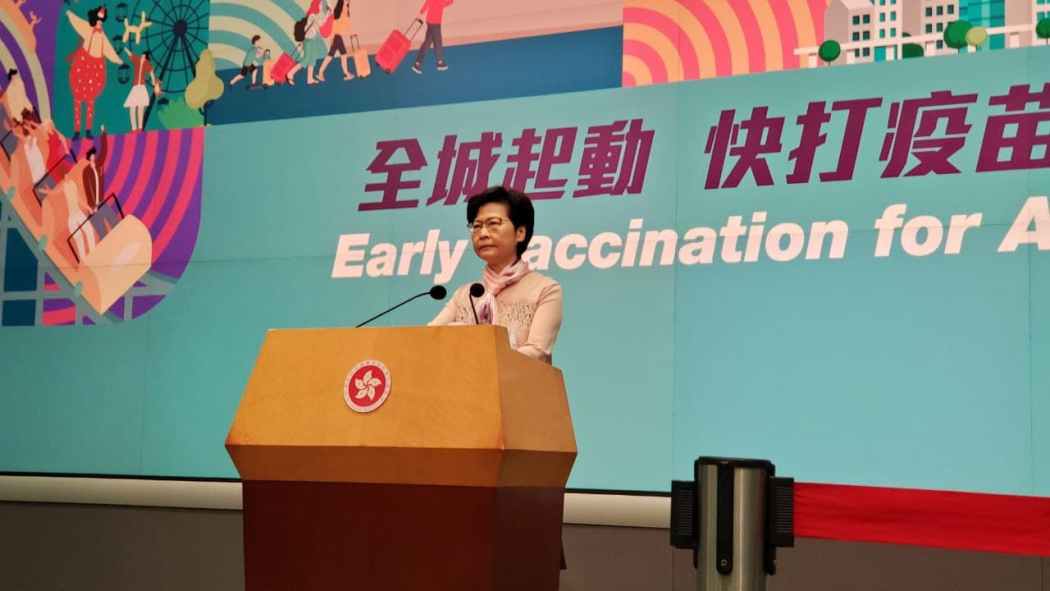Universities in Hong Kong have been “penetrated by foreign forces” intent on “brainwashing” students with an anti-China narrative, according to the city’s Chief Executive, Carrie Lam.
Lam said those who run Hong Kong’s universities should make sure their students are not “easily indoctrinated.” Her remarks came after pro-Beijing media slammed a group of US researchers who paid local students to count the turnout for a 2017 march as “incentivising violence” in the city.

At a weekly press conference on Tuesday, Lam said there was “no doubt” that external forces with “ulterior motives” were active in Hong Kong based on the events of 2019 until the enactment of the national security law last June.
“Either they want to undermine the Chinese government, or they have ideological prejudices against China. So these external forces are at work,” she claimed, without citing evidence.

Lam went on to claim that external forces have “penetrated” local institutions, including universities. She urged university managers to be “sensitive” and “extremely careful” to ensure students would not “brainwashed.”
“Make sure that university students will not be easily indoctrinated by those prejudices and bias, let alone to take part in activities that would breach the laws of Hong Kong,” she said.
July 1 demo
Lam’s remarks were in response to questions asked by the state-run China Daily, which cited media reports about a research study that paid students at the Hong Kong University of Science and Technology (HKUST) to play a role in the annual July 1 democracy rally in 2017.

The study, published in the American Economic Review earlier this month, looked into protest participation and the impact of social networks on political engagement.
According to HKUST, the study involved paying research subjects aged 18 or above to estimate turnout at two government-approved protests in July 2017 and June 2019. The published paper, however, stated that they studied “peaceful and modestly sized” protests in 2017 and 2018, and had no mention of their research subjects attending marches in 2019.
The research team of five included three US-based scholars, one in the UK and one in Australia. Among them, Jane Zhang, who is currently an associate professor at the University of New South Wales, had taught in HKUST between 2011 and 2019.
The 2017 protest was chosen partly because the protest was “unambiguously legal” and “peaceful in all years prior to the study.” The research then measured whether participants also took part in the 2018 July 1 protest of their own accord.

According to the Civil Human Rights Front, the turnout for the July 1 march in 2017 was around 60,000, while the organisers estimated that 50,000 joined the procession in the following year.
‘Western forces’
The pro-establishment Sing Tao Daily quoted critics who said that the study was proof that Western forces had interfered in Hong Kong’s affairs: “[The study showed] actions that incite violence, subversion and colour revolution,” the newspaper claimed.
State-run Wen Wei Po, on the other hand, said researchers had published the process and results of students taking part in “black violence and disruption of Hong Kong’s stability” as “academic achievements.”
A spokesperson for the HKUST told HKFP that all studies involving human participants proposed by its faculty members had to undergo a review by the Human Research Ethics Committee.
The spokesperson said the research in question was originally approved, but the approval was revoked after the panel found out in October 2019 that the methodology used differed from the proposal: “The proposal did not mention that ‘inducing protest participating’ is a central part of their study design and the proposal did not mention that any part of the participants’ payment amounts would be contingent on their attending a protest,” an email reply from the HKUST read.
The university said it asked the authors in late 2019 to remove all reference to its approval, adding that Zhang left the university in September that year.
The term “black violence” was coined in 2019 by the pro-establishment camp, referring to black-clad demonstrators and violence at protest scenes. Colour revolution refers to movements in former Soviet countries in the 2000s that led to the overthrow of governments. Beijing sees such movements as being organised or assisted by the US.
In the wake of the pro-democracy Umbrella Movement protests, then-chief executive Leung Chun-ying vowed to produce evidence of “foreign forces” in the protests. He later made reference to unnamed online sources.
Additional reporting: Candice Chau.
Correction 08.06.2021: A previous version of this article incorrectly stated that the research paper was published in the American Economic Review. The study was published in the American Economic Review: Insights.
Support HKFP | Policies & Ethics | Error/typo? | Contact Us | Newsletter | Transparency & Annual Report | Apps
Help safeguard press freedom & keep HKFP free for all readers by supporting our team
























